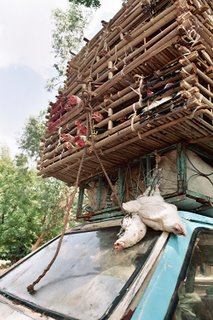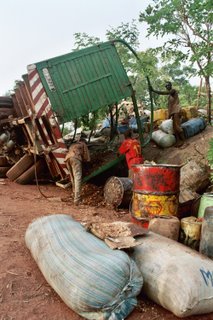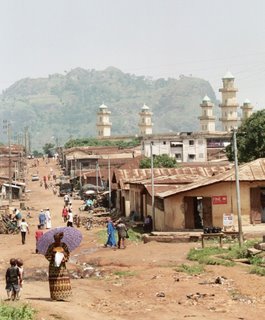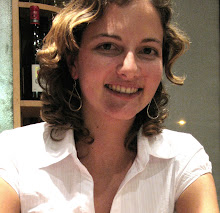
Although child beggars are no rare sight on the streets of West Africa, in Senegal the phenomenon has a unique twist. Here, packs of ragged children roam the city carrying tomato paste cans filled with sugar cubes. They stalk pedestrians, beg money from passing cars and scurry for any spare change thrown from the windows. Most are orphans, and many spend their days sleeping on the streets.
These children are known as Talibés, small armies of beggars commanded by powerful marabous (Islamic religious leaders) who collect the money at the end of the day. The marabous are supposed to be responsible for housing the children, feeding them and giving them an Islamic education, but from the state of most Talibés on the street it is clear that the system doesn’t tend to work in their favor. Most are dressed in rags and visibly malnourished. To a lot of foreigners they are just pests, but I was recently lucky enough to get to know one Talibé a little better.
Kara is 16, but looks about 12. He has a broad, somewhat goofy smile, a spindly frame and a chronic cough. He followed me home one night, just kept walking along with me even though I had assured him that I wasn’t giving him any money and that I lived a good ten minutes up the road. Kara didn’t seem to care. He had nowhere else to be, and he appreciated the chance to practice his French (most Talibés speak little to no French at all). He walked me all the way to my door, shook my hand and walked off, never asking for money again.
I began to see Kara around town, and every time I did he would hurry up to me with a grin and insist on walking me wherever I was going. We chatted about this and that, the weather, his friends, my working hours. One morning I was running late and hadn’t had time to eat breakfast, so I mentioned that I wanted to pick up something on the way. When he heard this, Kara reached under his dirty shirt and pulled out a half a loaf of bread.
“Here,” he said, “take this. Someone gave it to me.”
I didn’t know what to say. But I quickly assured him that I was not about to deprive him of his bread and ducked into a shop to buy a pain au chocolate. When I broke off a piece to give him, Kara shook his head. “No, you eat it,” he said. “I’ve already eaten this morning.”
The next week, my friend and I were walking along a main street when two men came up and aggressively tried to pickpocket us. We got away, but no sooner had we got clear of them than Kara came running up to us talking fast. He had seen the whole thing. In fact, he had even tried to push between us and the men, and got a rough elbow in the chest for his efforts. Not to be deterred, Kara ran over to one of the guards along the street to tell them that the two men were thieves.
At this point I was pretty impressed with the courage and integrity of this little guy. When I saw him again several days later, on the fête day of Korité (the last day of Ramadan), I was pleased to see that someone had given him a new boubou. This gave me an idea, and I decided to bring him back to my flat to see whether he would fit into some of the t-shirts a friend of mine had left. I had a whole pile of them sitting in a closet. So for the next hour or so Kara sat out on my porch, drinking the juice I poured him and munching on a piece of leftover pizza. He was excited about the shirts, insisting on folding each one meticulously before placing it carefully in a plastic bag (even the dirty ones). I held the bag as he folded, and as he worked he began to tell me about his world.
Both Kara’s parents are dead. After their death he went to live with his aunt, who kept him in school for several years and then opted to pull him out and send him to a marabou for a religious education. “She’s not a nice woman,” Kara muttered. “I would rather go to school, but now I have to live on the streets.”
The marabou beats the children, he told me, especially if they don’t bring back enough money in the evening. “Kids living like this start to do bad things. They drink, they fight, they do drugs. I don’t want to be like that. Now Youssou N’Dour,” Kara motioned toward the stereo where the famous Senegalese musician was playing, “he has a lot of money but he does good things. He gives his money to the poor. If I had money, I would do that too.”
I don’t know how much money Youssou N’Dour really does give to the poor, but he clearly had his little fan convinced.
Kara fell asleep on my couch, catching up on sleep, and when I went out later I sent him on his way. I handed him 80 cents for a plate of rice in the market and watched him wander off clutching the bulging bag of clothes. That was two weeks ago, and I haven’t seen him since.
I still look for Kara on my way to work, and hope to see him come running up jingling a couple of coins in his tomato paste can. I hope he hasn’t suffered any fall-out from the clothes I gave. I hope his cough hasn’t got worse. He’s already 16 years old; with luck, he’ll soon be old enough to work himself out of his servitude, or at least to find his own way off the streets.
But in the mean time, I think I’d like to buy him a new boubou for Tabaski. If anyone sees a scraggly kid with ideals far beyond his circumstances, send him my way.
These children are known as Talibés, small armies of beggars commanded by powerful marabous (Islamic religious leaders) who collect the money at the end of the day. The marabous are supposed to be responsible for housing the children, feeding them and giving them an Islamic education, but from the state of most Talibés on the street it is clear that the system doesn’t tend to work in their favor. Most are dressed in rags and visibly malnourished. To a lot of foreigners they are just pests, but I was recently lucky enough to get to know one Talibé a little better.
Kara is 16, but looks about 12. He has a broad, somewhat goofy smile, a spindly frame and a chronic cough. He followed me home one night, just kept walking along with me even though I had assured him that I wasn’t giving him any money and that I lived a good ten minutes up the road. Kara didn’t seem to care. He had nowhere else to be, and he appreciated the chance to practice his French (most Talibés speak little to no French at all). He walked me all the way to my door, shook my hand and walked off, never asking for money again.
I began to see Kara around town, and every time I did he would hurry up to me with a grin and insist on walking me wherever I was going. We chatted about this and that, the weather, his friends, my working hours. One morning I was running late and hadn’t had time to eat breakfast, so I mentioned that I wanted to pick up something on the way. When he heard this, Kara reached under his dirty shirt and pulled out a half a loaf of bread.
“Here,” he said, “take this. Someone gave it to me.”
I didn’t know what to say. But I quickly assured him that I was not about to deprive him of his bread and ducked into a shop to buy a pain au chocolate. When I broke off a piece to give him, Kara shook his head. “No, you eat it,” he said. “I’ve already eaten this morning.”
The next week, my friend and I were walking along a main street when two men came up and aggressively tried to pickpocket us. We got away, but no sooner had we got clear of them than Kara came running up to us talking fast. He had seen the whole thing. In fact, he had even tried to push between us and the men, and got a rough elbow in the chest for his efforts. Not to be deterred, Kara ran over to one of the guards along the street to tell them that the two men were thieves.
At this point I was pretty impressed with the courage and integrity of this little guy. When I saw him again several days later, on the fête day of Korité (the last day of Ramadan), I was pleased to see that someone had given him a new boubou. This gave me an idea, and I decided to bring him back to my flat to see whether he would fit into some of the t-shirts a friend of mine had left. I had a whole pile of them sitting in a closet. So for the next hour or so Kara sat out on my porch, drinking the juice I poured him and munching on a piece of leftover pizza. He was excited about the shirts, insisting on folding each one meticulously before placing it carefully in a plastic bag (even the dirty ones). I held the bag as he folded, and as he worked he began to tell me about his world.
Both Kara’s parents are dead. After their death he went to live with his aunt, who kept him in school for several years and then opted to pull him out and send him to a marabou for a religious education. “She’s not a nice woman,” Kara muttered. “I would rather go to school, but now I have to live on the streets.”
The marabou beats the children, he told me, especially if they don’t bring back enough money in the evening. “Kids living like this start to do bad things. They drink, they fight, they do drugs. I don’t want to be like that. Now Youssou N’Dour,” Kara motioned toward the stereo where the famous Senegalese musician was playing, “he has a lot of money but he does good things. He gives his money to the poor. If I had money, I would do that too.”
I don’t know how much money Youssou N’Dour really does give to the poor, but he clearly had his little fan convinced.
Kara fell asleep on my couch, catching up on sleep, and when I went out later I sent him on his way. I handed him 80 cents for a plate of rice in the market and watched him wander off clutching the bulging bag of clothes. That was two weeks ago, and I haven’t seen him since.
I still look for Kara on my way to work, and hope to see him come running up jingling a couple of coins in his tomato paste can. I hope he hasn’t suffered any fall-out from the clothes I gave. I hope his cough hasn’t got worse. He’s already 16 years old; with luck, he’ll soon be old enough to work himself out of his servitude, or at least to find his own way off the streets.
But in the mean time, I think I’d like to buy him a new boubou for Tabaski. If anyone sees a scraggly kid with ideals far beyond his circumstances, send him my way.







